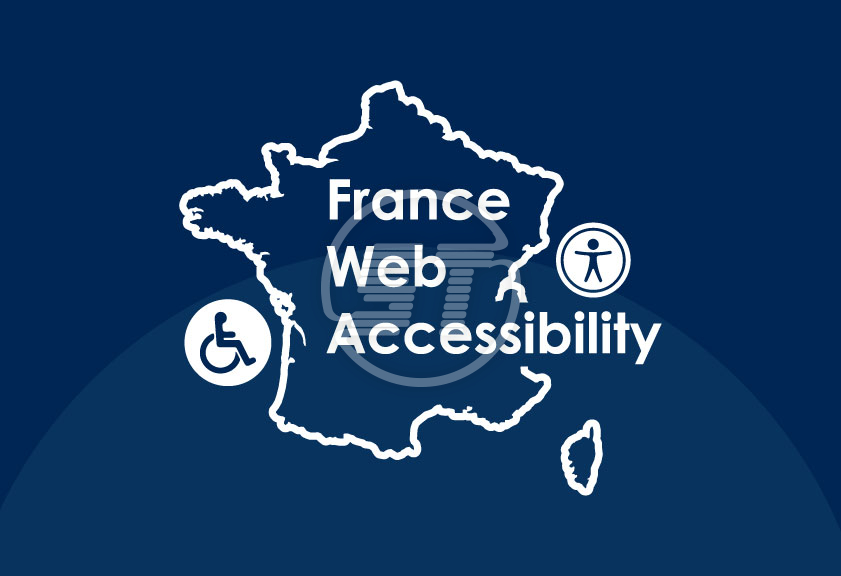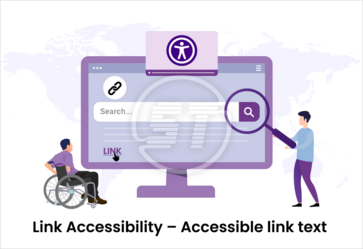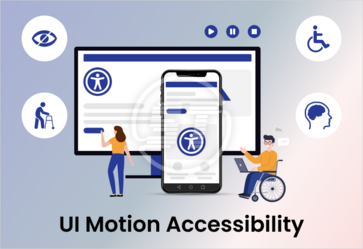In past few years, France has also begun aspiring to achieve its digital accessibility goals. There were around 5.95 million disabled adults in 2019 in France (according to a publication released by INSEE – National Institute of Statistics and Economic Studies) and the numbers are increasing every year significantly. The French government developed the French Disability Act (RGAA), which is based on the Web Content Accessibility Guidelines (WCAG).
This article will focus on this accessibility law and its requirements for organizations operating in France.
RGAA – What do you know about it?
RGAA (Référentiel Générale d’Accessibilité pour les Administrations’) or General Accessibility Framework for Administrations, helps to validate the accessibility of online information provided by different organizations. Each organization (based out and/or operating in France) and administrative authorities ought to implement best web practices to ensure digital accessibility for everyone. France has a technological reference to verify compliance standards that are mandatory to adhere to.
Not only people with disabilities, but elderly people or other users also encounter troubles while accessing the web content, it is also a part of web exclusion that ultimately lands websites in a vulnerable situation in terms of lawsuits and penalties.
RGAA is based on Article 47 of Law No 2005-102 of February 11, 2005, on Equal Rights and Responsibilities and applies to businesses that have annual revenue over 250 million euros (based on a three-year average). Smaller businesses are not explicitly required to abide by RGAA; however, they are expected to conform to the laws.
So, each organization/business must conform with WCAG level A, AA and EN 301 549 to be accessible in France.
Requirements of Article 47 of the Law No. 2005-102
Article 47 is amended by Ordinance No. 2023-859 of September 6, 2023, and this updated version came into force on September 8, 2023.
Every online public communication service of each organization should be accessible to people with disabilities under defined suggestions. The recommendations are set by the decree of the Council of State.
The Article is not applied to any web public communication service of non-profit organizations that do not provide essential public services specifically addressing the needs of persons with disabilities.
Accessibility of any type of online public services (websites, applications, intranet, software packages, etc.) regardless of its means of access and mode of consultation is mandatory. Moreover, the implementation of standards should not create a disproportionate burden on the organizations. This disproportionate burden is also defined by the decree of the Council of State in Article L. 146-1 of the Social Action and Families Code.
Organizations are required to publish an accessibility declaration to showcase how accessibility has been implemented. Their home page must have an accessibility statement. Also, they need to draw up a multi-year plan to maintain their online public communication services’ accessibility.
- The exempted content is mentioned in 4 of Article 1 of Directive (EU) 2016/2102 of the European Parliament and the Council of 26 October 2016 on the accessibility of the websites and mobile applications of organizations. The exemption can differ according to the type of online public communication service. Moreover, the decree defines the terms and conditions for training organizations’ staff who are working on online public communication services.
Read the official document to understand the requirements completely.
Consequences of Noncompliance
A person with a disability asks for compensation from the court if they find inaccessibility issues in an online public communication service. The penalty or lawsuit consequences may differ depending on the extent of the harm sustained. Also, if the organization is found to be guilty of consecutive violations, it may be named as a non-conforming entity within six months after a complaint is filed. Therefore, organizations’ website and digital assets must comply with all required testing, training, and documentation recommendations.
Measures to be taken to avoid legal implications due to inaccessibility!
Most importantly, identify pages that have issues using periodic data analytics reports for the web pages. RGAA has three audit statuses to determine if the website/application and other online products and services are legally abided by the laws or not – compliant, non-conforming, and not relevant.
The organizations must take necessary steps to resolve accessibility issues in a reasonable amount of time by remediating some crucial elements such as,
- Alt text for images
- Captions for videos
- Screen magnifiers
- Keyboard-only alternatives
- Text size and color
- Color contrasts
- All forms, buttons, and menu.
There are many accessibility platforms and checkers to conduct accessibility tests to verify the legislative requirements of all online public communication services and products. Those accessibility checkers help remediate inaccessibility of the digital products/services by detecting errors and providing recommendations.
Both manual and automated website accessibility audits are suggested to ensure maximum accessibility of online public communication services or products.
Wrapping up
RGAA portrays a crucial milestone in EU web accessibility politics. W3C and the nonprofit organization ensures to make the web accessible for all with RGAA in effect.
We are a proud W3C (World Wide Web Consortium) and IAAP (International Association of Accessibility Professionals) member and a part of the global accessibility community to stay up to date with compliance guidelines.
We are providing website ADA WCAG 2.1 and 2.2 Level A, AA, AAA remediation services, Website ADA Compliance Audit, VPAT Accessibility Conformance Report, Accessibility Document Remediation, Ongoing Website Accessibility monitoring, Accessibility Training, Consulting, Support and AI quick website accessibility improvements .
Reach out at hello@skynettechnologies.com to make your website accessible and inclusive according to RGAA or request an ADA website accessibility quote!


